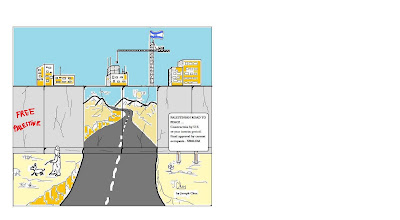
Sept. 22, 2009
By Joseph Chez
Benjamin Netanyahu was elected Prime Minister of Israel in 1996 reflecting the hawkish attitude of Israel and Netanyahu's own personal promise to derail any peace talks with the Palestinians. He however partially failed, given that the world body wants to resolve the issue of the Palestinian question of a two state solution.
Comprehensive talks on the Israeli/Palestinian issue were taken up by the Madrid/ Oslo Peace Accord beginning in 1991. However, subsequent agreements have followed without success. This may be because Israel has not necessarily been on board, but has felt pressured to participate. Thus, primarily for those reasons, Israel has made it difficult for the Palestinians to meet much of the requirements as called for in the Madrid/Oslo Peace Accord, or subsequent agreements, such as the Hebron Agreement, the Wye River Memorandum, Camp David,The Beirut Summit and most recently, the Road Map for Peace. But despite the core issues of discord - final borders, Jerusalem and the right of return of displaced Palestinians - the most contentious issue has been the continued building of Jewish settlements in contested Palestinian land.
Since July 2002, the United States, Europe, the United Nations and Russia have actively pushed the Road Map for Peace, but with little success. In contravention of previous accords or Security Council Resolutions 242 and 338, Israel continues building illegal settlements under its understanding of "natural growth." Israel in addition, has tightened its security in occupied Palestinian land and consequently, Palestinians have suffered in ways which have been deemed "inhuman" by the U.N. General Assembly. Of course, Israel claims its right of self defense and continues to reciprocate attacks on its people by Palestinian insurgents.
In 1996, when Netanyahu was first elected, he initiated the reciprocal policy of retribution against Palestinian or Arab attacks on Israel. His political ticket for election then was for Israel not to participate in the peace process with the Palestinians. Unofficially, the State of Israel has since continued the same doctrine to this day, although, the tit-for-tat military responses against the Palestinians have been "disproportionate" as labeled by the latest United Nation's findings.
On the verge of CHANGE of US policy, President Obama was elected and took office in 2009. Consequently, Israel felt it no longer had the exclusive support of the U.S. and therefore, a coalition of the extreme right, once again, elected Benjamin Netanyahu in April 2009 as Israel's Prime Minister. Regrettably, Netanyahu's political platform was no different this time than in 1996.
President Obama, well respected and with high world popularity, has felt confident in the resolution for peace in the Middle East. However, Benjamin Netanyahu has remained steadfast in his stance of no peace negotiations with the Palestinians or cutting back on settlement building. In fact, as President Obama was calling for an immediate cessation of illegal settlements in contested Palestinian lands, newly elected Netanyahu argued that "natural growth" must continue. To this day, the US government has tacitly accepted that fact.
Today, the first meeting since their election, President Obama and Benjamin Netanyahu met in Washington and it was more than obvious that President Obama showed his frustration with the lack of movement on the peace process. Accordingly, President Obama has asked for the Palestinians to take more concrete measures to assure the security of Israel, while at the same time, he has asked for Israel to provide greater freedom for the Palestinians as well as restrain on continued settlement activity. In sum, President Obama has stated that, " despite all the obstacles, the history, despite the mistrust, we must find a way forward... We can not continue with the same pattern of talking tentative steps forward and then stepping back". He also emphasized that peace negotiations must be given the opportunity to succeed and that even though, it would not be easy, that it was absolutely critical for all parties, including the world.
The question remains however, is whether, despite the hawkish and unyielding Benjamin Netanyahu, will President Obama succeed in his efforts to resolve the conflict between Israel and the Palestinians - over the contested piece of holy land? Is President Obama greater and more influential than any previous prophet? After all, the road to peace has been mired by insurmountable obstacles and endless delays which places any prospect for peace - distant and unattainable.
And yet, while the hawk is resolute in its position against peace and a two state solution, the dove may just have the final word: The United States of America will now recognize the legal and complete political sovereignty of the State of Palestine with borders pre-existing 1967, consistent with UN Security Council Resolution 242, 252 and subsequent United Nations measures, thereof.
Peace.
By Joseph Chez
Benjamin Netanyahu was elected Prime Minister of Israel in 1996 reflecting the hawkish attitude of Israel and Netanyahu's own personal promise to derail any peace talks with the Palestinians. He however partially failed, given that the world body wants to resolve the issue of the Palestinian question of a two state solution.
Comprehensive talks on the Israeli/Palestinian issue were taken up by the Madrid/ Oslo Peace Accord beginning in 1991. However, subsequent agreements have followed without success. This may be because Israel has not necessarily been on board, but has felt pressured to participate. Thus, primarily for those reasons, Israel has made it difficult for the Palestinians to meet much of the requirements as called for in the Madrid/Oslo Peace Accord, or subsequent agreements, such as the Hebron Agreement, the Wye River Memorandum, Camp David,The Beirut Summit and most recently, the Road Map for Peace. But despite the core issues of discord - final borders, Jerusalem and the right of return of displaced Palestinians - the most contentious issue has been the continued building of Jewish settlements in contested Palestinian land.
Since July 2002, the United States, Europe, the United Nations and Russia have actively pushed the Road Map for Peace, but with little success. In contravention of previous accords or Security Council Resolutions 242 and 338, Israel continues building illegal settlements under its understanding of "natural growth." Israel in addition, has tightened its security in occupied Palestinian land and consequently, Palestinians have suffered in ways which have been deemed "inhuman" by the U.N. General Assembly. Of course, Israel claims its right of self defense and continues to reciprocate attacks on its people by Palestinian insurgents.
In 1996, when Netanyahu was first elected, he initiated the reciprocal policy of retribution against Palestinian or Arab attacks on Israel. His political ticket for election then was for Israel not to participate in the peace process with the Palestinians. Unofficially, the State of Israel has since continued the same doctrine to this day, although, the tit-for-tat military responses against the Palestinians have been "disproportionate" as labeled by the latest United Nation's findings.
On the verge of CHANGE of US policy, President Obama was elected and took office in 2009. Consequently, Israel felt it no longer had the exclusive support of the U.S. and therefore, a coalition of the extreme right, once again, elected Benjamin Netanyahu in April 2009 as Israel's Prime Minister. Regrettably, Netanyahu's political platform was no different this time than in 1996.
President Obama, well respected and with high world popularity, has felt confident in the resolution for peace in the Middle East. However, Benjamin Netanyahu has remained steadfast in his stance of no peace negotiations with the Palestinians or cutting back on settlement building. In fact, as President Obama was calling for an immediate cessation of illegal settlements in contested Palestinian lands, newly elected Netanyahu argued that "natural growth" must continue. To this day, the US government has tacitly accepted that fact.
Today, the first meeting since their election, President Obama and Benjamin Netanyahu met in Washington and it was more than obvious that President Obama showed his frustration with the lack of movement on the peace process. Accordingly, President Obama has asked for the Palestinians to take more concrete measures to assure the security of Israel, while at the same time, he has asked for Israel to provide greater freedom for the Palestinians as well as restrain on continued settlement activity. In sum, President Obama has stated that, " despite all the obstacles, the history, despite the mistrust, we must find a way forward... We can not continue with the same pattern of talking tentative steps forward and then stepping back". He also emphasized that peace negotiations must be given the opportunity to succeed and that even though, it would not be easy, that it was absolutely critical for all parties, including the world.
The question remains however, is whether, despite the hawkish and unyielding Benjamin Netanyahu, will President Obama succeed in his efforts to resolve the conflict between Israel and the Palestinians - over the contested piece of holy land? Is President Obama greater and more influential than any previous prophet? After all, the road to peace has been mired by insurmountable obstacles and endless delays which places any prospect for peace - distant and unattainable.
And yet, while the hawk is resolute in its position against peace and a two state solution, the dove may just have the final word: The United States of America will now recognize the legal and complete political sovereignty of the State of Palestine with borders pre-existing 1967, consistent with UN Security Council Resolution 242, 252 and subsequent United Nations measures, thereof.
Peace.







No comments:
Post a Comment